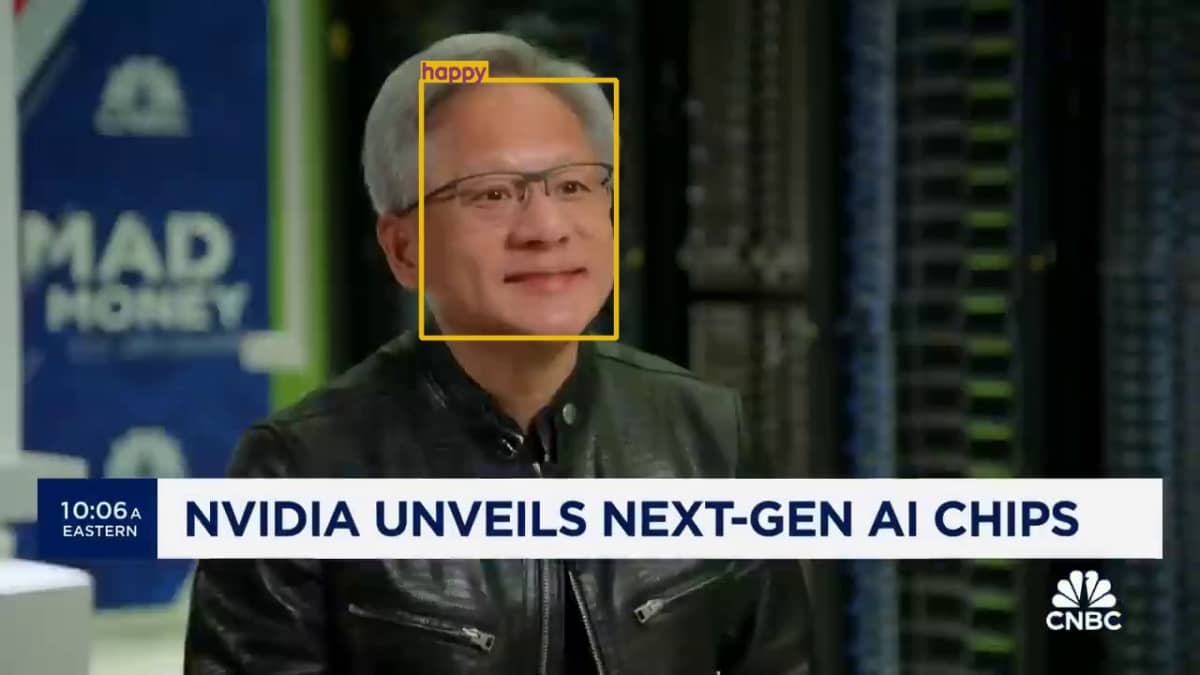
The Role of Emotion in Leadership- An Analysis with Emotion AI
In the business world, successful CEOs are often seen as mysterious figures. Sentiment analysis can be a powerful tool to delve deeper and understand the unspoken aspects of their communication, including their basic emotions. Interestingly, research suggests that decisive action, not necessarily perfect decisions, is a key factor in CEO success. One study even found that decisive leaders are 12 times more likely to thrive than their counterparts who hesitate. Effective CEOs demonstrate the ability to make swift choices, even in uncertain situations.
Moreover, CEOs aren't just leaders in their boardrooms; they're the face of their companies. Their every move, every word, holds weight, especially for investors - both those considering entering the market and those already invested. Investors closely watch CEOs' actions because these actions directly impact how the market perceives the company and, consequently, shareholder returns. A CEO's emotional intelligence, their ability to handle interactions with stakeholders calmly and wisely, can greatly affect investor confidence.
Despite being closely watched, there's an interesting trend. Some CEOs are careful about their public image, while others embrace their individuality. For example, figures like Peter Thiel and Elon Musk often act unconventionally, exploring new territories and sparking discussions in the market.
Some studies have concluded that a CEO's personality can influence a company's stock market performance. CEOs who are conscientious, or dependable, and achievement-oriented, tend to lead companies with lower stock volatility and higher returns when the company takes on more risk. In contrast, companies with CEOs who are neurotic or extroverted experience higher volatility and lower returns with increasing risk.
Emotional intelligence, which involves understanding basic emotions, is a key trait among successful CEOs. They excel at understanding and responding to others' emotions, fostering a positive work environment.
Additionally, CEOs with active online profiles, particularly on platforms like LinkedIn and Twitter, wield greater influence. Even minimal engagement humanizes them, offering genuine insights into their leadership.
Studies show that socially active CEOs are perceived 23% more positively, inspiring trust and credibility among employees and consumers. Furthermore, their presence on social media helps communicate company values, shape reputation, and demonstrate leadership during crises.
We've conducted in-depth analyses of CEO video interviews using our Emotion AI technology, uncovering valuable insights into their decision-making processes, emotional responses, and leadership styles. This deeper understanding not only enhances the ability of financial professionals to interpret market dynamics but also offers nuanced perspectives for investors, contributing to more informed decision-making and market analysis.
Let’s check out one by one.
1. Nvidia CEO Exudes Confidence in Disruptive Technologies
 .
.
Nvidia's CEO, Jensen Huang, exudes confidence in his cutting-edge approach to computing. He is clearly enthusiastic about software and "accelerated computing" as the future, highlighting their efficiency gains and commitment to innovation with the development of the world's largest chip. Jensen Huang seems driven to push boundaries and revolutionize industries with faster, more energy-saving technology. However, they also acknowledge the importance of human expertise alongside AI advancements, particularly in algorithm development and deep learning.
Sentiment analysis of CEOs in video interviews can provide valuable insights that go beyond their words. Using Imentiv AI, one of the latest emotion recognition tools, we've decoded the psychological nuances of the featured video with NVIDIA's CEO. His predominantly happy facial expression aligns with a positive valence, suggesting an overall positive emotional state.
As we delve deeper, the content of the interview emerges as epistemic, indicating a focus on knowledge acquisition and exploration (which means the interview content focuses on acquiring knowledge, suggesting an explorative tone). With the CEO's cheerful manner and the intellectually engaging conversation, it indicates high excitement and enthusiasm. This sets a neutral tone for the atmosphere within the interview.
2. Decoding the Interview: A Multi-Factor Approach (Accenture, JP Morgan, & Airbnb)

Accenture CEO Julie Sweet comes across as optimistic and forward-thinking in the video. She's excited about the potential of AI to transform businesses but acknowledges the challenges leaders face in navigating its disruptive impact. Sweet emphasizes the importance of open-mindedness and embracing AI to maximize its benefits. This requires overcoming fear and actively seeking to understand the technology. Her focus is on fostering a cultural shift within Accenture, prioritizing continuous learning and agility over specific backgrounds when recruiting talent.
In this interview, JPMorgan CEO Jamie Dimon comes across as cautious and experienced. Despite the current bullish market sentiment, he expresses concern, hinting at a sense of watchfulness. While acknowledging challenges in commercial real estate, he downplays fears with a tone of confidence. Dimon appears competitive, advocating for fair regulations to navigate the non-bank lending landscape.
During a past interview, Brian Chesky shared his connection to Airbnb while acknowledging the initial resistance they faced from cities and landlords. He emphasizes how Airbnb has addressed these concerns and is now focused on an exciting future - crafting complete travel experiences for its users.
While the specific content of each video differs, interestingly, the emotion AI analysis reveals a consistent emotional tone across all three. To delve into the psychological aspects of CEO interviews effectively, we need to consider multiple factors like facial expressions, emotional tone, and the overall atmosphere. Let's break down this analysis using emotion, arousal, and valence.
(Emotion refers to the feelings expressed, valence indicates whether those feelings are positive or negative, and arousal refers to the level of excitement or calmness conveyed by the individual.)
Emotion:
- The CEO's facial expression primarily appears neutral with occasional hints of happiness. This blend suggests a calm demeanor with underlying positive emotions, fitting for the context of an interview.
- The neutral expression indicates professionalism, confidence, and control over emotions, which are typical traits expected from a CEO in a public appearance.
- The intermittent display of happiness could be attributed to moments of success, achievement, or positive discussions during the interview. It reflects the CEO's engagement and satisfaction with the topics being discussed.
Excitement (Arousal):
- Considering the intellectual nature of the video, the arousal level (arousal reflects excitement levels seen in facial expressions or behaviors) is likely moderate. Epistemic emotions, which are associated with cognitive processes like curiosity and interest rather than intense excitement, are predominant.
- The CEO's composed demeanor suggests a stable excitement level, indicating focused attention and cognitive processing without extreme excitement or agitation.
- Occasional spikes in arousal may occur during pivotal points of discussion or when addressing particularly stimulating topics related to the company's strategies, innovations, or future prospects.
The Valence (Sentiment) of Emotion:
- The prevailing valence (valence indicates emotional positivity or negativity displayed by individuals) of emotion in the video is positive, characterized by a blend of neutrality and happiness.
- Neutral facial expressions contribute to a positive valence by projecting objectivity and rationality, fostering a calm and collected image.
- Intermittent displays of happiness add to the positive tone of the interview, signaling enthusiasm, optimism, and satisfaction.
- The positive sentiment of emotion fosters a constructive and engaging atmosphere, conducive to productive communication and audience engagement.
In summary, the psychological analysis of the CEO video interviews reveals a balanced interplay of emotions, arousal, and valence. Their expressions convey professionalism and positivity, fostering moderate arousal levels and an optimistic atmosphere.
3. PayPal CEO Walks a Tightrope Between Apology and Innovation

In this interview, PayPal's new CEO, Alex Chriss, comes across as a mix of determined and apologetic. He acknowledges recent criticisms of slow innovation and a lack of focus on customers. Despite this, Chriss exudes excitement for the future, promising to "shock the world" with upcoming innovations at their Innovation Day. His emphasis is on customer-centric solutions leveraging AI-driven personalization, aiming to benefit both consumers and small businesses. He also recognizes the need for profitable growth, suggesting a shift towards focusing on core businesses and away from less lucrative ventures.
Let’s see how a Video Emotion Recognition tool like Imentiv AI analyzed this video, and read the insights.
Facial Expression of the CEO:
- If the CEO's facial expression remains neutral or impassive throughout the interview, it indicates an effort to maintain professionalism.
- This neutrality may suggest an intentional suppression of emotions to convey composure and control.
- It implies a focus on delivering information clearly and concisely, prioritizing professionalism over personal emotions.
Overall Emotional Tone of the Video:
- An epistemic tone suggests a focus on imparting knowledge, facts, or insights.
- Epistemic emotions are linked to learning and cognitive engagement rather than strong emotional reactions.
- This indicates that the interview likely revolves around discussing informative topics relevant to PayPal and its stakeholders.
Excitement Level:
- Moderate to low arousal levels suggest a calm and intellectually stimulating atmosphere.
- Interest or engagement arises primarily from the informational content rather than dramatic elements.
- The interview is more about imparting knowledge than evoking intense emotional responses.
The valence of Emotion:
- In an epistemic context, emotions tend to be neutral or slightly positive.
- The focus is on acquiring knowledge rather than eliciting strong emotional reactions.
- The interview may spark curiosity, interest, or satisfaction among viewers interested in the discussed subject matter.
The psychological analysis suggests that the PayPal CEO's neutral facial expression and the epistemic tone contribute to a calm and intellectually engaging atmosphere. The emphasis is on professionalism and delivering information effectively, with minimal emphasis on evoking strong emotional responses.
4. Contrasting Visions: ChatGPT CEO vs. Microsoft CEO on AI's Future

Sam Altman expresses optimism about AI advancements such as ChatGPT, foreseeing a transformation in knowledge work. He minimizes concerns about Artificial General Intelligence (AGI), suggesting a short phase of panic followed by adaptation. In contrast, Satya Nadella urges caution, highlighting the potential risks of surpassing human intelligence and the necessity for regulations. This cautious approach might be attributed to underlying emotions of fear regarding the unforeseen consequences of unchecked AI advancement.
Both CEOs stress the importance of ongoing safety measures and responsible decision-making in AI development, acknowledging the absence of a simple "off switch" for AI. This conversation emphasizes the significance of safety and the requirement for collaboration with governments to address the ethical and regulatory challenges of AI's future.
The psychological analysis of the video interview with Imentiv AI, a sentiment analysis tool, reveals that the ChatGPT CEO's facial emotion is neutral and the Microsoft CEO appears happy, while the overall emotion of the video is epistemic (about knowledge and understanding).
We can explore the aspects of emotion, arousal, valence, and their implications.
Facial Emotion of ChatGPT CEO (Neutral):
- Valence/ Sentiment: The ChatGPT CEO's neutral facial expression suggests a lack of overt positive or negative emotions, portraying a composed demeanor.
- Arousal/ Excitement: The neutral expression corresponds to moderate arousal levels, indicating engagement without heightened excitement.
- Interpretation: This neutrality may convey professionalism, objectivity, and a focus on the interview's content, aiming to maintain a balanced perspective and avoid bias.
Facial Emotion of Microsoft CEO (Happy):
- Valence/ Sentiment: The happy expression of the Microsoft CEO suggests positive emotions such as joy or enthusiasm.
- Arousal/ Excitement: The happiness exhibited likely reflects moderate to high arousal levels, indicating engagement and confidence.
- Interpretation: This happiness may stem from satisfaction with the topics discussed, confidence in the company's endeavors, or enjoyment of the interview process.
Overall Emotion of the Video (Epistemic)
- Valence/ Sentiment: Epistemic emotions are typically neutral, focusing on intellectual engagement rather than emotional positivity or negativity.
- Arousal/ Excitement: The overall emotion of the video, being epistemic, suggests moderate arousal levels, reflecting intellectual stimulation and engagement.
- Interpretation: The epistemic nature of the video indicates a focus on knowledge, understanding, and exploration of ideas rather than emotional expression, prioritizing rational discourse and effective communication.
This AI-powered video emotion analysis suggests a contrast in facial emotions between the ChatGPT CEO and the Microsoft CEO, with neutrality and happiness respectively. However, the overall emotion of the video is characterized by an epistemic tone, emphasizing engagement and exploration of ideas. This suggests a focused discussion, with both participants contributing to a constructive exchange of knowledge and understanding.
5. Toshiba Scandal: CEO Takes Contrite Tone for Accountability

Facing a massive $1.2 billion scandal, Toshiba's CEO takes a contrite tone, apologizing to shareholders and other affected parties. He readily accepts management's responsibility for the situation and announces his resignation, highlighting the seriousness of the issue and his commitment to accountability. This public display of remorse suggests the CEO is deeply concerned about the company's reputation and the impact on stakeholders. This remorse might be driven not only by regret but also by the CEO's fear of the lasting negative impact on Toshiba's reputation.
Here's the psychological summary provided by Imentiv AI:
In the video, the owners of a firm display sad and neutral emotions in response to news of a Toshiba scandal, alongside an overall epistemic tone.
Let's delve into the emotions, arousal, and valence:
Emotion Analysis:
- Sadness: The owners' display of sadness indicates a deep emotional response to the news, likely stemming from feelings of loss, disappointment, or regret.
- Neutral: Their neutral emotions may suggest an attempt to maintain composure in the face of challenging news, possibly indicating emotional suppression or detachment.
Excitement level
- Negative valence (sentiment): Sadness inherently carries a negative valence, reflecting distress or unhappiness. The neutral expressions also contribute to the overall negative tone, lacking positive affect or enthusiasm.
Epistemic Tone:
- Intellectual and informative: The epistemic tone suggests a focus on conveying information and promoting understanding, aligning with the serious nature of the news being reported and the emotional reactions of the owners.
This psychological analysis with AI indicates a mix of sadness and neutrality in the owners' emotions, with low excitement levels and predominantly negative sentiment. The overall tone focuses on understanding and analyzing the implications of the Toshiba scandal, rather than eliciting strong emotional responses.
CEOs project a variety of emotions and styles, but AI analysis can reveal underlying trends. By understanding the CEO's emotional state, arousal level, and message valence, investors and stakeholders can gain valuable insights into the leadership approach and company direction.
Imentiv AI's emotion recognition technology helps decode these nonverbal cues, offering a deeper understanding of CEO communication and decision-making. Sentiment analysis of CEOs offers a powerful tool for investors, stakeholders, and even employees to gain a more nuanced understanding of the people leading the companies they interact with.
Want to make smarter investment decisions? Dive deeper into how Emotion AI is revolutionizing financial analysis. Read our recent blog post here!